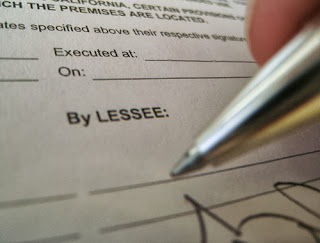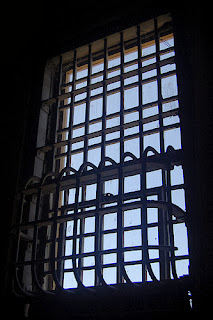 |
| Image of a lease by Jess and Colin, via Flickr.com |
Well, remember that high level of curtailments? That meant landlords who expected to have the same tenant for at least two or three or sometimes four years ended up with no tenant - and often no rent - whenever an American left ahead of schedule. Even those who stayed what the Department considers a full tour - those first-tour staff members who were only assigned for two years - looked to landlords like they were slipping out of town early. When the Department assigns someone for two years, any partial month spent in the country counts as part of the time. An employee who arrives on the last day of August is considered to have completed 24 months in the country if he stays until at least the first of July. But even someone leaving earlier than that is excused if the departure is within 60 days of arrival, making a departure on June 1 to be acceptable. Then it takes up to two months for the new employee to find a place to rent. We always insisted that staff members have a diplomatic escape clause in the lease, so the landlord couldn't hold us individually responsible for being ordered to leave the country before the lease expired.
My situation is a good example. I arrived in Barbados after Thanksgiving in 1989. But I didn't move into my house until New Year's Eve. I didn't bring up my curtailing to get into the summer bidding cycle when I moved from the consular to budget office and my extending by a year when Alex got his job in St. Lucia with my landlord because it wouldn't affect him for at least another 18 months. But then when I was assigned to Moldova in response to a volunteer telegram, I ended up leaving in August of 1992. I considered that a full assignment since I was leaving within 60 days of October 1. My landlord, on the other hand, responded that he had expected me to stay for a full three years, not two years and 8 months.
 |
| Image of bars on a window by Rob Young, via Flickr.com |
There were also automobile dealers. Barbados follows the British road system with cars driven on the left side of the road. Because it costs much more in Barbados to insure a car equipped with the steering wheel on the left side (something I failed to learn until it was too late and our car was delivered), many people chose to buy a car in Barbados at duty-free prices. However, only vehicles that were still in bonded warehouses could be purchased duty free. Cars on the lots had already had their duty paid by the dealer. The dealers could get the duty returned, but the Bajan government operated at Caribbean speed which meant the delay could be up to a year. One kind-hearted dealer many years before had agreed to sell a car that had been released from the bonded warehouse to a member of the embassy staff, on the promise that the person would be in Barbados at least a year - the time required for a vehicle to be in the hands of a diplomat without duty being owed. You probably already know the rest of the story. The staff member left Barbados within a year, the Bajan government refused to return the duty paid by the dealer, and the dealer was out of luck.
Oh, did I forget to mention that duty on vehicles in Barbados was 100% of the value of the car?
When American staff members' tours were curtailed, we would have to send a diplomatic note to the Foreign Ministry to request that the unpaid duty be waived. Most people who left early didn't want to take a car with the steering wheel on the wrong side of the car for where they were going next, but even those who brought in cars with steering wheels on the wrong side of the car for Barbados didn't want to take them with them because there was no unleaded gasoline in Barbados. Rarely did someone pay to have the catalytic converter removed from cars before leaving for overseas because of the bureaucratic headaches of getting paperwork the garages in the U.S. needed to remove them, and the Department wouldn't reimburse employees for the cost of removing them - they only reimbursed employees for the cost of reinstalling them if the car was brought back to the U.S.
Every time one of these diplomatic notes went to the Foreign Ministry, they would balk at waiving the unpaid duty, but there was usually some compassionate argument to get them to agree. Until one was requested for me.
I had brought in a car from the U.S. and I had been in the country long enough not to have to pay duty for it, but the summer before I left Barbados, the summer when I extended my tour for a fourth year, Tim*, the new employee who received the first pencil from the staff of the Budget and Fiscal office, had brought in a nine-year-old Nissan Stanza hatchback. It had been his mother's car and he brought it with him to Pakistan, his previous assignment, where vehicles were only duty free if they had been in the country for three years. That meant he couldn't sell his car in Pakistan without someone, either buyer or seller, paying the duty. Tim had the car sent to Miami where it sat in a warehouse while he was in Washington, D.C., studying Spanish for that assignment that was broken so he could come to Barbados instead. The Nissan had been sitting in the sun, waiting to be shipped for nearly a year.
 |
| Image of a Nissan Stanza in much better shape than ours by rscottjones, via Flickr.com |
But then, eight months later, I was assigned to Moldova. Because I had little time to get ready for the transfer, when the Foreign Ministry refused the request for a waiver of the duty free because this transfer did not look to them like there was any compassionate need, we sent diplomatic notes to both the Foreign Ministry and the Finance Ministry to request information about how much the duty would be if the vehicle were sold in Barbados. We got a response from the Finance Ministry. I paid the duty, and then I sold the car to one of the local employees of the embassy.
Six months later, the general services officer at the embassy in Barbados contacted me to tell me that I needed to pay more for the duty on the car. The Foreign Ministry informed the embassy that the Finance Ministry did not calculate the full amount. The additional amount they requested I pay was almost to the penny what I had sold the car for.
Instead of paying the additional amount, I requested that the embassy ship that now nearly 11-year-old Nissan to Moldova. The story of what happened to the car there will have to wait for a later project.
*a name, not necessarily the right one
No comments:
Post a Comment